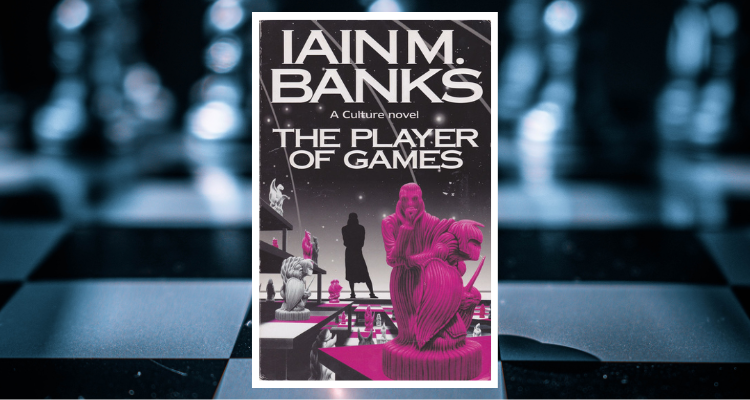|
Jernau Morat Gurgeh is a citizen of the Culture - one of many teeming billions in the post-scarcity interstellar civilisation. He has a special talent, however, which marks him out as unique. He is a game-player of legendary skill. Over his lifetime, he has mastered every card-, board-, and computer-based game that is known to the Culture. Constant success breeds boredom, and so Gurgeh becomes restless.
Eventually, he receives word of a remarkable new challenge which he is later forced to accept. His mission is to travel to the distant Empire of Azad, a decadent and cruel star-faring society which uses a game to determine its political hierarchy. The game of Azad is so dizzyingly complex that even Gurgeh may not be able to learn it during the years-long journey. When he arrives, he finds that there is more at stake than his reputation - the fate of civilisations may be on the table. The Player of Games is the second novel to be published in Iain M. Banks’ revered Culture cycle, following Consider Phlebas (1987). It is often thought to be one of the most popular of the books, and is sometimes suggested to be a good starting point. It is an engaging character study of Gurgeh, and a story which deals cleverly with themes of power, manipulation, and the nature of games.
One criticism of Consider Phlebas as a starting point in the series is that it is a story told from the perspective of an outsider and enemy of the Culture. The Player of Games takes a different approach. Jernau Morat Gurgeh is in many ways a typical Culture citizen. He lives on a vast artificial habitat - Chiark orbital - and enjoys all the comforts of his civilization. He attends social functions and has many friends, both human and drone.
What makes Gurgeh exceptional is his prodigious ability as a player of games. He not only plays games, but also designs his own and contributes to scholarly studies of the subject. It is this talent which triggers the relatively simple but satisfying plot of the book. The Culture’s intelligence agency, Special Circumstances, seizes on both Gurgeh’s skills and his jaded boredom. They coax him to visit the Empire of Azad, even though it means giving up years of his life. When Gurgeh arrives in the Empire, he is given a knowledgeable local escort and gradually explores this society, which has been carefully studied by the Culture for some time. Gradually, he begins to understand that while the Empire is decadent on the surface, it is truly depraved and cruel underneath. Over time, Gurgeh suspects that his mission has great strategic significance for the enlightened Culture, which is diametrically opposed to the Empire’s brutal ways. Initially, Gurgeh struggles to understand the immensely complex game of Azad, despite the training and support provided by his ship’s computer. Eventually he discovers a potent talent for it, and becomes a serious contender. By eliminating various rivals with strong religious and military connections, Gurgeh climbs the Empire’s hierarchy. This threatens to set up a confrontation with the Emperor himself, and might determine the future of the entire Empire.
One striking aspect of The Player of Games is its structure. While Consider Phlebas had a strongly episodic structure, this book comprises one single narrative which is somewhat more concise. The book consistently follows Gurgeh and his actions, both on Chiark orbital and later in the Empire of Azad. As a character, Gurgeh has some similarities with Louis Gridley Wu, the lead character in Larry Niven’s novel Ringworld (1970). Both are jaded, bored citizens of an interstellar civilisation, looking to get more out of life.
While the plot is strongly linked to the game of Azad, Banks never really describes it in any detail. Initially, we learn only that it is extremely complex, that it is played over a series of sprawling boards, and that it is common for players to form alliances in a bid to eliminate others. Later, Banks reveals that in later rounds it is common for players to make grisly bets to spice up the action; losing might mean being castrated or suffering some other mutilation. This detail reinforces the depraved nature of the Empire. While Banks did have a strong interest in games, the novel is really more concerned with games as a means to explore the concept of power. While Gurgeh believes himself to be a player, he gradually realises he is also a pawn in a much larger game with far greater stakes. Once again, Banks explores the moral dimension of the Culture. It is enlightened and it values freedom - but to achieve this it exploits and manipulates Gurgeh, and interferes in the internal politics of the Empire of Azad. The reader is left to draw their own conclusions about the morality of this, just as they must imagine what the game itself might look like or how it might play. Despite these weighty themes, The Player of Games also contains some flashes of Banks’ trademark humour. This comes across especially in Gurgeh’s interactions with the drones in his life - sentient machines afforded citizenship and personhood in the Culture.
The Player of Games is a very different book to Consider Phlebas, which reflects Banks’ evolving style at the time. It is less action-oriented, and has a more direct and conventional narrative. It explores more aspects of the Culture, and especially the way it interacts with other civilisations - these themes will recur in the third novel in the series, and probably the most celebrated: Use of Weapons (1990).
0 Comments
Your comment will be posted after it is approved.
Leave a Reply. |
About
Exploring classic science fiction, with a focus on the 1950s to the 1990s. Also contributing to Entertainium, where I regularly review new games. Categories
All
|

